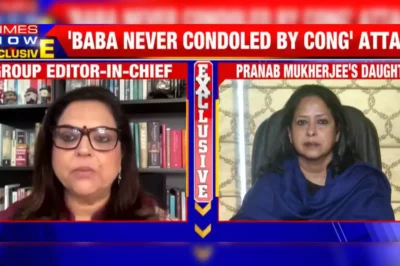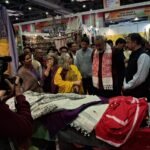A recent revelation by Sharmistha Mukherjee, daughter of former President Pranab Mukherjee, has sparked a heated debate surrounding the Congress Party and its recognition of veteran leaders. In an exclusive interview, Sharmistha expressed her dismay over the Congress Working Committee’s (CWC) decision not to hold a formal condolence meeting for her father after his passing. She also hinted at the possibility of former Prime Minister Dr. Manmohan Singh being denied the Bharat Ratna, adding fuel to an already contentious discussion about the treatment of political stalwarts within the party.
Sharmistha Mukherjee’s Concerns About Her Father’s Memorial
Sharmistha Mukherjee voiced her disappointment over the Congress Party’s handling of her father’s legacy. Pranab Mukherjee, a statesman with a political career spanning over four decades, served as President of India from 2012 to 2017 and held multiple key positions within the Congress Party, including a long-standing association with the CWC.
During the interview, she remarked, “I was very hurt that the CWC did not formally condole my father’s death. He was a senior Congress leader for 45 years and a prominent figure in the party’s history.”
Her comments have raised questions about the party’s approach to acknowledging the contributions of its former leaders, particularly those who had a significant influence on India’s political landscape.
The Alleged Denial of Bharat Ratna to Dr. Manmohan Singh
Sharmistha Mukherjee also addressed the controversy surrounding Dr. Manmohan Singh, who served as Prime Minister from 2004 to 2014. Known for his contributions to India’s economic reforms and governance, Singh has often been lauded as one of the most influential leaders in the country’s history.
The revelation that he may have been overlooked for the Bharat Ratna, India’s highest civilian award, has stirred debate. Critics have argued that Singh’s tenure as both a reformer and a statesman makes him deserving of such recognition. Sharmistha’s remarks have led many to speculate whether political considerations influenced the decision.
Broader Implications for the Congress Party
These revelations come at a time when the Congress Party is facing internal challenges and criticisms over its handling of veteran leaders’ legacies.
- Loyalty vs. Recognition:
The lack of formal recognition for figures like Pranab Mukherjee and Dr. Manmohan Singh raises concerns about how the party values long-term loyalty and contributions. - Erosion of Legacy:
Political analysts have suggested that sidelining prominent figures could lead to an erosion of the party’s historical legacy, especially when these leaders have played crucial roles in shaping the party’s identity. - Impact on Morale:
The apparent disregard for veteran leaders could impact morale within the party, particularly among those who have dedicated their lives to its cause.
Public and Political Reactions
Sharmistha Mukherjee’s comments have drawn strong reactions from various quarters. While supporters of the Congress Party argue that such criticisms are unfounded, opposition leaders have seized the opportunity to question the party’s internal dynamics.
Social media has also been abuzz with debates over the treatment of leaders like Pranab Mukherjee and Dr. Manmohan Singh, with many calling for a reevaluation of how political contributions are honored.
Conclusion
The controversy surrounding the alleged denial of Bharat Ratna to Dr. Manmohan Singh and the Congress Party’s approach to Pranab Mukherjee’s memorial raises significant questions about the party’s recognition of its stalwarts. As these debates continue, they highlight the importance of honoring contributions to national development, regardless of political affiliations or internal party dynamics. Recognizing the legacies of leaders like Mukherjee and Singh is not just a matter of political symbolism but also a testament to the values of gratitude and respect in Indian democracy.








Leave a Reply